Iran Says Nuclear Talks With World Powers To Resume November 29
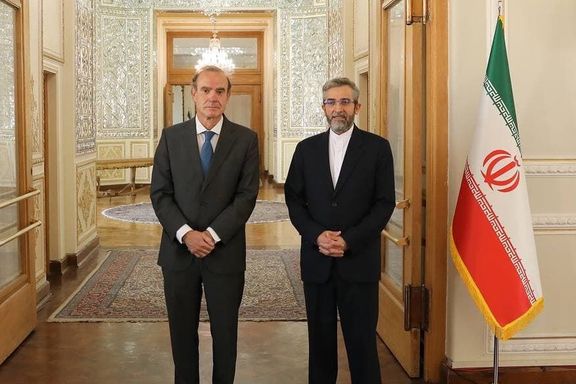
Iran's talks with world powers will resume on November 29, its top nuclear negotiator, Ali Bagheri Kani, said as concerns over Tehran's nuclear advances grow.

Iran's talks with world powers will resume on November 29, its top nuclear negotiator, Ali Bagheri Kani, said as concerns over Tehran's nuclear advances grow.
"In a phone call with @enriquemora, we agreed to start the negotiations aiming at removal of unlawful & inhumane sanctions on 29 November in Vienna," Bagheri Kani wrote in a tweet.
In April, Tehran and six powers started to discuss ways to salvage the nuclear pact, which has eroded since 2018, when then-President Donald Trump withdrew from it and reimposed sanctions on Iran, prompting Tehran to breach various limits on uranium enrichment set by the pact.
But negotiations have been on hold since the June election in Iran of hardline President Ebrahim Raisi, who is expected to take a tough approach when the talks resume in Vienna.
In Washington, US State Department spokesperson Ned Price said the United States hoped Tehran would return to the talks in good faith and ready to negotiate, saying Washington still believed it was possible to quickly reach and implement an understanding on a mutual return to compliance with the deal.
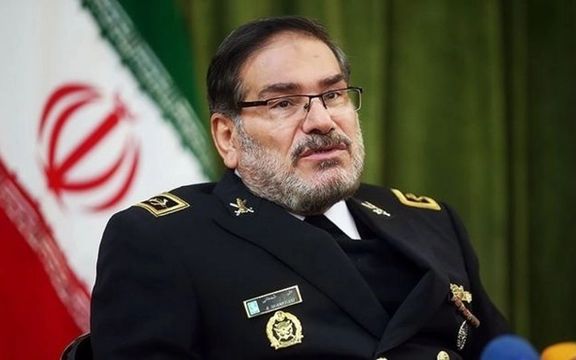
Iran’s national security chief has tweeted that “the powerless US president” is unable to give guarantees and without it the fate of the nuclear talks is clear.
In a series of tweets on Wednesday, Ali Shamkhani compared Iran’s current sanctions to conditions during the 1980s Iran-Iraq war when he said they were also calls for talks.
Iran’s top national security official added that during the war “Soldiers at the fronts were defending and now scientists will continue their legal nuclear activities”.
Iran has been enriching uranium this year to 20 and 60 percent purity, violating the terms of the Joint Comprehensive Plan of Action (JCPOA) and so far, not returning to multilateral nuclear talks that it left in June. Tehran says that since the United States and Europe have not honored their commitments under the JCPOA, it has a right to expand its nuclear program.
One of Iran’s demands is that President Joe Biden must provide guarantees that a future US president will not leave the agreement, as Donald Trump did in 2018. But if an agreement is not ratified by the US Senate as a treaty, no president can provide such a guarantee.
Shamkhani wrote that “the powerless US president is unable to provide a guarantee” and if the situation does not change “the fate of the nuclear talks is clear”.
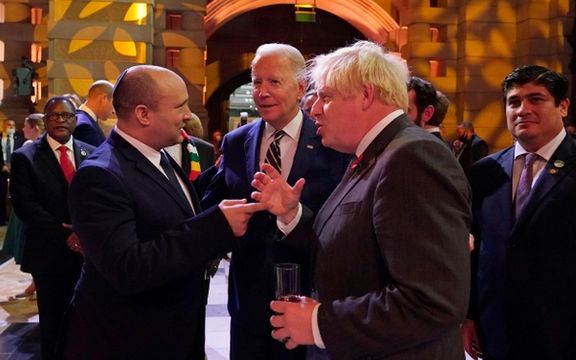
Israeli Prime Minister Naftali Bennett had meetings with world leaders in Glasgow, discussing Iran's nuclear issue, and advising them to be tough with Tehran.
Israeli media report quoting sources that Bennett had many productive meetings during the world climate summit in Glasgow, where other leaders were interested to know Israel’s opinion about how to deal with Iran and its analysis on Tehran’s intentions.
The Israeli prime minister had long talks with French President Emmanuel Macron and British Prime Minister Boris Johnson. The Times of Israel reported that discussions about Iran revolved two major issues – “what world powers can do to change Iranian behavior, and what Israel is doing independently.”
Iran suspended negotiations with world powers in June and has not returned to Vienna where six rounds of talks took place starting in April. Iran’s new hardline government is increasingly adopting a tougher posture that intends to change what was already agreed and perhaps even the established process whereby the United States was negotiation indirectly with the Iranian delegation.
A source told The Times of Israel that “There is a feeling in the world something has to happen,” and other countries want to know what Israel thinks.
Israeli media are also reporting that Bennet advised other leaders to be tough with Tehran, while most are thinking to use the traditional carrot and stick approach to coax Iran to play by diplomatic rules and reach an agreement on reestablishing limits to its nuclear program.
Meanwhile Bennett tried to solidify Israel’s strengthening ties with regional and Asian countries. He accepted an invitation to visit India and he invited Bahrain’s Salman Al Khalifa to visit Israel, an invitation he accepted.
Jerusalem Post reported that Bennett told world leaders to put more pressure on Iran, taking a hard line in the UN Security Council and in the International Atomic Energy Agency (IAEA).
Iran has reduced its cooperation with the UN nuclear watchdog this year but Western countries decided in the September meeting of the agency’s board of governors not to table a censure against Iran.
Bennett also reiterated Israel’s argument that without a firm plan to prevent Iran from obtaining nuclear weapons it would be a mistake to lift sanctions, giving Tehran a financial lifeline that it can use to finance its malign activities in the region.
US officials believe a drone attack in October on a US base in southern Syria was supported and “encouraged” by Iran, and last Friday the Treasury Department announced sanctions against Iranian officials and entities that assist its military drone program.
The Soufan Center, a counterterrorism and anti-extremism think tank reported on Tuesday that Iran is increasingly willing “to take direct military action against its adversaries” and force the US out of Iraq and Syria to be able to have free access for resupplying Hezbollah in Lebanon.
The report said, “It can be argued that the U.S. withdrawal from Afghanistan in August has led Iranian leaders to assess that direct U.S. military pressure can compel the United States to withdraw from the region completely.”
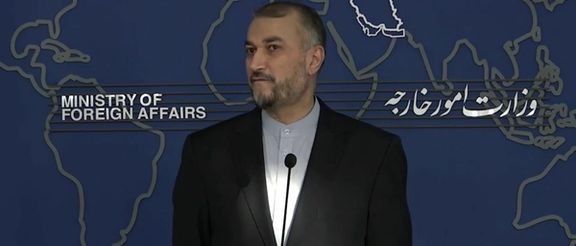
Iran’s foreign minister tweeted Tuesday that Tehran was closely watching the behavior of US President Joe Biden after the latest US sanctions imposed last week.
"The White House calls for negotiations with Iran and claims to be ready to return to the JCPOA,” wrote Hossein Amir-Abdollahian, referring to Iran’s 2015 nuclear deal with world powers, the Joint Comprehensive Plan of Action, which the US left in 2018.
“Yet it simultaneously imposes new sanctions on Iranian individuals and entities,” the foreign minister continued. “We are closely examining Mr. Biden's behavior.”
Iran has long argued that the onus for reviving the JCPOA lies with the US as the party that left it. Washington has said its own return should be negotiated alongside agreement as to how Iran reduces its nuclear program, which it has expanded and refined since 2019.
Talks in Vienna aimed at reviving the JCPOA – with remaining world powers and Iran participating formally and the US indirectly – began in April but were suspended in June by Iran saying that its new president Ebrahim Raisi (Raeesi) needed time for transition. But it is now clear that Tehran has been delaying it return trying to adopt a tougher posture.
In another tweet Tuesday, Amir-Abdollahian reiterated that negotiations should not be "talking for the sake of talking, but to achieve tangible results." Amir-Abdollahian suggested Monday that the US could simply lift sanctions incompatible with the JCPOA through executive action, the means used by previous president Donald Trump to impose them.
On Monday Foreign Ministry Spokesman Saeed Khatibzadeh said Tehran was waiting for Washington to "take action" and that the latest US sanctions, related to Iran's drone program, highlighted contradictions in White House behavior. The spokesman said the JCPOA could be revived "very quickly" if the US lifted all sanctions imposed by Trump.
Another pressing issue is a request from Rafael Mariano Grossi, head of the International Atomic Energy Agency (IAEA) for an urgent meeting in Tehran to discuss IAEA access to the Karaj site, near Tehran, where Iran makes centrifuges, which are used to enrich uranium. Tehran has not allowed agency access on the grounds it is carrying out a security investigation after a drone attack in June.
Amir-Abdollahian has been quarantined since Monday due to coronavirus infection and the foreign minister spokesman Saeed Khatibzadeh has said his schedule of programs has changed but his general condition is good and he is doing his daily work in quarantine.
While some social media users have pointed out that Amir-Abdollahian did not wear a mask in public and have suggested that his Covid infection may be due to using the homegrown Barakat coronavirus vaccine, some journalists and social media users have suggested that the foreign minister's illness may be an excuse to delay Grossi’s looming visit to Tehran and his team's return to nuclear talks.
"What a time for Amir-Abdollahian to have a Covid infection! Exactly on time!," Saeed Maleki, an independent journalist tweetedwhile another user tweeted that the foreign minister's illness and change of programs was similar to Iranian athletes' excuses to avoid competing against Israeli rivals in international competitions.
In interview with Euronews Thursday Grossi said he hoped to visit Tehran "in the near future" and meet with Raisi. Amir-Abdollahian referred to the visit as “certain” but said the date was “not important.”
For weeks Tehran has said that while it considers when it should resume talks, the US should as a goodwill measure waive the threat of punitive action against third parties to allow them to transfer $10 billion owed to Iran.
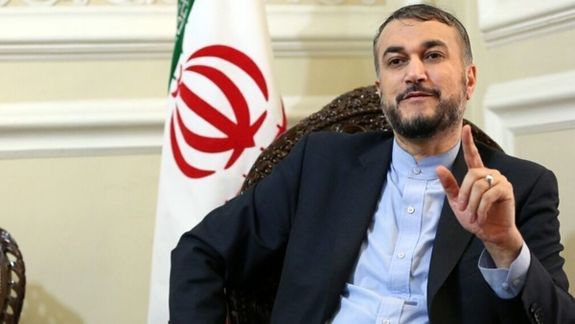
Iran’s foreign minister has criticized the United States for its posture in JCPOA nuclear talks, demanding lifting of all US sanctions imposed since 2018.
Hossein Amir-Abdollahian tweeted Tuesday that “The White House calls for negotiations with Iran…Yet it simultaneously imposes new sanctions on Iranian individuals & entities”.
The US Treasury Department on October 29 announced new sanctions on a few Iranian officials and companies for their role in the Unmanned Aerial Vehicle (UAV) program of the IRGC and its Qods (Quds) Force. Days earlier, drones suspected to have been supplied by Iran hit a US base in southern Syria.
The Iranian foreign minister fired off a second tweet saying that the goal of the nuclear talks should be “tangible results on the basis of respect for mutual interests”. He added that the remaining members of the Joint Comprehensive Plan of Action (JCPOA) should be ready for talks.
Iran has been hardening its posture in recent days, demanding the full removal of all US sanctions imposed since 2018, when former president Donald Trump withdrew from the JCPOA. It is has also said it will not have any contacts with the US until all sanctions are lifted.
Amir-Abdollahian has tested positive for Covid-19 and is in quarantine.

Iran’s hardening posture in the nuclear talks this week and its continuing economic crisis, generated starkly opposing commentaries in Tehran media on Monday.
Conservative commentator Abdollah Motevallian has outlined the Islamic Republic's policy and expectations of the negotiations from the perspective of the revolutionary guards (IRGC) ina front-page commentary in the IRGC's daily newspaper Javan while acknowledging that many political activists in Iran and abroad question the Raisi administration's foreign policy, particularly regarding the JCPOA.
He stressed that Raisi looks at the JCPOA and nuclear negotiations as issues independent of Iran's problems, mindless of the fact that Iranian and other analysts have said repeatedly that Iran needs to get the JCPOA back on track and have the sanctions lifted to begin to solve its worsening economic crisis.
Motevallian outlined Iran's policy about the nuclear deal and negotiations in what he called "the new round of face-off with the West", most probably reflecting IRGC's worldview:
Motevallian explained that Iran will return to its commitments under the JCPOA only if all the sanctions are lifted and a valid international guarantee is given to Tehran that no such sanctions will be ever imposed again.
This is a maximalist position, if it reflects the thinking of hardliners who dominate the government.
On the other end of the political spectrum, reformist daily Arman published an interview with political scientist Pirouz Mojtahedzadeh in which the firebrand reformist academic warned the Raisi administration that foreign policy is not always similar to sabre rattling. Mojtahedzadeh charged that the administration lacks political will, and its negotiating team is devoid of creativity and initiatives.
Mojtahedzadeh stressed: "Diplomacy is a creative art. If someone knows he is not bestowed with that art, he should try to master it. But if he does not know that he does not have it, he will remain as he is and will do nothing." However, he charged that all previous governments in Iran had the same problem.
"I hope Raisi takes leave for a few hours to ponder on why he is president and what is he intends to do to reduce the hardship people have to endure. He should ask himself if he really has a mission for his country to accomplish," Mojtahedzadeh said.
"Raisi should realize that there is no other way to solve Iran's problems in the international arena other than maintaining a positive and constructive communication with the world," he continued, adding that "I do not mean we should necessarily maintain relations with Israel. But what is wrong with being friends with Canada or Australia? We should have good ties even with the United States in order to facilitate trade with the rest of the world. This is what can improve the people's livelihood."
Mojtahedzadeh said that "under the circumstances," he has no hope in the future of the negotiations as long as capable diplomats are not part of the negotiating team or as long as at least their consultation is not sought.